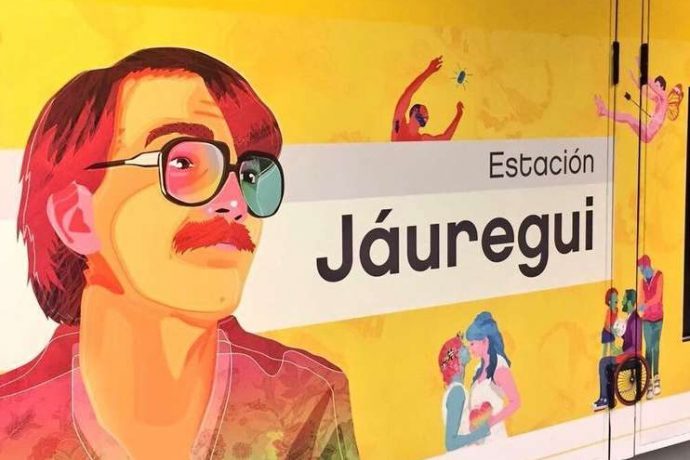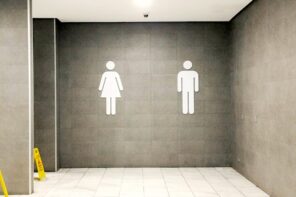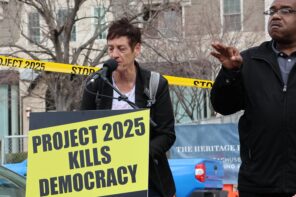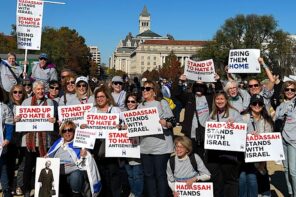In conjunction with the Academy of Criminal Justice Sciences conference, the University of California Press blog republished “Why Do Some Countries Disapprove of Homosexuality? Money, Democracy and Religion,” which was originally published on The Conversation earlier this month. The article was written by Amy Adamczyk, a sociology professor at City University of New York and author of National Public Opinion about Homosexuality: Examining Attitudes Across the Globe, published by University of California Press in January. From the article, which draws on data from more than 80 countries drawn from the World Values Survey:
Countries dominated by Islam, Eastern Orthodoxy and those that have a mixture of conservative and mainline Protestant faiths are more likely to disapprove.
In contrast, nations dominated by mainline Protestant religions and Catholicism—such as Sweden, Spain and the United Kingdom—are much more liberal.
Why are people from Muslim majority nations so opposed to homosexuality? Both Islam and conservative Protestant faiths generate high levels of religious belief. Most religious texts say that homosexuality is problematic. More religious people are more likely to take these religious precepts seriously. When a large proportion of people are highly dedicated to their religion, everyone within the country tends to develop more conservative views.
In these countries, the media are likely to reflect dominant religious views. Schools and businesses are more likely to support religious perspectives that disapprove of homosexuality. The government may censor the media so that they do not violate religious sensibilities. They may also restrict nonprofit organizations and human rights groups that promote views inconsistent with conservative religious values. Religious friends and family members are likely to reinforce anti-homosexual views.
International Anti-Trans Bus Tour & PR Campaign
The anti-trans bus tour in Spain that we reported on earlier this month is part of an international strategy. The Spanish bus was sponsored by HazteOir, a Spain-based group that mobilizes Catholic conservatives and their allies in Spain and Europe. A billboard with the same visuals and messaging showed up in Guatemala, branded as a project of CitizenGo, with which HazteOir is affiliated. Then, this past week, the National Organization for Marriage brought the bus tour to the U.S. with a press conference in New York City. HazteOir’s Ignacio Arsuaga and NOM’s Brian Brown sit together on the board of CitizenGo; Arsuaga helped launch Brown’s International Organization for the Family in December.
The press release announcing the U.S. bus tour wrapped the project in rhetorical attacks that Pope Francis has made on “gender ideology”:
The bus tour organizers echoed a sentiment repeatedly raised by Pope Francis, that “gender ideology” is “an error of the human mind that leads to so much confusion” and is a key element in why “the family is under attack.” The Pope has condemned the teaching of “gender theory” in public schools, especially in developing nations, where he says it amounts to “ideological colonization” by influential western countries such as the United States. “And this is terrible,” the Pope said last August. “We are experiencing a moment of the annihilation of man as the image of God.”
UN: Some countries challenge religious freedom report dealing with sexuality
Earlier this month, United Nations Special Rapporteur on freedom of religion and belief Ahmed Shaheed, delivered his first report to the Human Rights Council. The report, which addresses intolerance and persecution of religion minorities, asserts that individuals, not religions or belief systems, are the “right-holders” of the rights to freedom or belief. It also addresses the relationship between religious freedom and equality for LGBT people and others:
The right to freedom of religion or belief and the right to equality are intimately linked. It is not enough only to recognize equality as constituting an underlying principle of this right; it would be more appropriate to view the right to freedom of religion or belief as also constituting a right to equality. This right prohibits discrimination on the basis of religion or belief system, recognized as sacrosanct by a number of human rights instruments. It must be clear, however, that the right to freedom of religion or belief does not give the individual – as a right-holder – the power to marginalize, suppress or carry out violent acts against other individuals and those in vulnerable situations, such as women or members of the lesbian, gay, bisexual, transgender and intersex (LGBTI) community, under the guise of manifesting their religion, or as constituting the “moral high-ground”.
Several countries, including Libya and Iran, questioned the inclusion of sexuality in the report.
In other U.N. news, the U.S. State Department defended the Trump administration’s decision to name representatives of two strongly anti-LGBT organizations—C-Fam and the Heritage Foundation—to the United Nations Commission on the Status of Women. Also last week, the Trump administration dropped U.S. participation in hearings being held by the Inter-American Commission on Human Rights.
Philippines: President cites Catholic heritage in backtracking on marriage equality
President Rodrigo Duterte, who has become infamous for a wave of extra-judicial killings carried out with his approval, said during his 2016 presidential campaign that he would consider signing legislation to legalize marriage by same-sex couples. But now, citing the country’s Roman Catholicism, he has reversed course. From The New York Times:
Mr. Duterte stressed that the country was Asia’s bastion of Roman Catholicism, which steadfastly opposes same-sex marriage.
He pointed to a recent issue of Time magazine that tackled gender issues, featuring a transgender woman on its cover.
“That is their culture,” he said, referring to other countries where the American magazine circulates. “That’s for them. That can’t apply to us, because we are Catholics,” Mr. Duterte said in a lengthy speech on Sunday to the small Filipino community in Myanmar, where he arrived as part of a visit to bolster regional ties. He left for Thailand on Monday. …
His allies in the House of Representatives, who control the votes there, have relegated a bill that seeks to protect the rights of gays and lesbians to the back burner, arguing that it was not a priority.
The bill would have legalized same-sex civil marriage in the Philippines, where the Catholic Church wields substantial political influence.
The church successfully blocked until 2012 the passage of a family planning law that called for free contraceptives, and it is still in the forefront of efforts to stymie talk of legalizing divorce. Apart from the Vatican, the Philippines is the only nation in the world that still outlaws divorce.
Asian Journal reports that Duterte said that while he cannot allow same-sex couples to marry because it would violate the Constitution, he thinks people should do whatever makes them happy, as long as they don’t break the law:
“But if you would ask me what makes you happy, do it. You can only do it once. Never to return back. This is one straight deal. So whatever makes you happy, you go out of this universe happy and fulfilled. If it makes the gays happy, let them be. I do not condemn anybody there. What makes you happy, good. Just don’t violate the law,” he said.
But he did not feel the same way about transgender people, reports the Times:
Mr. Duterte, who turns 72 next week, said he was only following what was in the books, asserting that he did not take issue with anyone’s sexuality. Two of his brothers-in-law, and some of his cousins, are gay, he said.
But he stressed: “Wherever God has placed you, stay there.” He noted that no one was empowered to “erase the great divide between a woman and a man.”
Australia: Priest takes on ‘gay panic defense’; hate speech change debated
The parliament of Queensland abolished the “gay panic” defense – a term for the theory that a straight person’s response to a homosexual advance could somehow justify downgrading a murder charge. Paul Kelly, a Catholic priest, was moved to lead a public campaign for the change after the 2008 murder of a gay man on his church grounds; the killers were convicted of manslaughter rather than murder after invoking the “gay panic” defense.
The Australian reports that Muslim and Jewish religious leaders have raised concerns over discussions about extending a law against racial discrimination “to include people claiming they have been offended or insulted because of their sexual orientation, disabilities or age.” The Australian reports that some religious leaders are concerned, in the words of Islamic Council of Queensland spokesman Ali Kadri, that “the misinterpretation of such laws can trample upon religious freedom to criticize sexual preferences.”
Taiwan: Court hears challenge to man-woman definition of marriage
A 14-judge panel of Taiwan’s highest court is considering a challenge to the legal definition of marriage as between a man and a woman. The parliament has also been debating marriage equality, which the president supports. From the BBC:
It’s the first time the judiciary is opening the Constitutional Court on the issue. If the judges rule that Taiwan’s current ban is unconstitutional, then parliament will be forced to amend the laws to offer gay couples protection.
Lawmakers, while initially supportive, have become less enthusiastic about passing such bills after vocal opposition by mainly religious groups and parents.
If the judges rule in favour of it, they will in essence be doing the dirty work for lawmakers, who can then tell their voters they have no choice but to amend the laws.
But it’s still unclear how this would play out.
If same-sex marriage is approved, the LGBT community does not want a separate law to be created that only gives some protection to same-sex partners.
They want current family laws to be amended so that gay couples would be treated the same as heterosexual couples, as they would then get equal rights and treatment in all matters, including adoption of children.
Commonwealth: Trudeau determined to advance LGBT rights
The Globe and Mail reported on March 18 about Canadian Prime Minister Justin Trudeau’s determination to advance LGBT rights within the Commonwealth, which writer John Ibbitson calls ”one of the world’s most homophobic institutions.”
Thirty-six of the Commonwealth’s 52 nations, representing two billion people, criminalize homosexual activity. Penalties range from jail time to execution. Even in countries where the laws aren’t strictly enforced, just having them on the books encourages a climate of violence, including murder—which often goes unpunished—and “corrective rape.” Intolerance, persecution and ignorance increase the spread of HIV/AIDS. More than two million are infected in India alone.
While the United Nations and the Organization of American States condemn violence against sexual minorities, the Commonwealth remains silent on the issue, with many of its members opposed to any concessions.
A key vote, he writes, will be in June, when the Board of Governors will meet and could decide to give accreditation to the NGOI the Commonwealth Equality Network.
But the situation is delicate. “The global North can’t just go storming into the global South,” [Trudeau advisor] Mr. [Randy] Boissonnault said in an interview. “We have to work through our allies.”
Then-British prime minister David Cameron probably did more harm than good in 2011, when he threatened to cut foreign-aid funding to countries that discriminated against homosexuals. A better approach, which Canada and the U.K. are jointly pursuing, is to fund local organizations that advocate for same-sex equality, to raise the issue with heads of government in private meetings, to invite LGBT activists from developing countries to Commonwealth summits and generally to employ carrots rather than sticks.
After all, observes Lewis Brooks, who is head of research at the Royal Commonwealth Society in London, Britain imposed sodomy and gross indecency laws on its former colonies in the 19th century. “For the U.K. and other Western countries to turn round and try and impose the reverse is not appropriate, has moral questions around it, and is likely to get a whole range of countries to backlash against it,” he said in an interview.
Earlier this month Malta Prime Minister Joseph Muscat called for Commonwealth countries to repeal colonial-era sodomy laws.
Ivory Coast: Sentencing over ‘public indecency’ raises fears
Ivory Coast is among the minority of African countries that “do not explicitly criminalize homosexuality or same-sex acts,” reports Reuters, and its commercial capital of Abidjan is “a relatively tolerant city” for LGBTI people “in a region where homosexuality is mostly illegal, and sexual minorities face persecution, discrimination and violence.” But the sentencing of two gay man under a public indecency law that comes with a harsher sentence for acts with a person of the same sex “has sent shivers through the LGBTI community.”
Yann, 31, and Abdoul, 19, were arrested in the southwestern city of San Pedro in October after rumors spread about the nature of their relationship, leading Abdoul’s uncle to file a police complaint as he believed Yann was abusing his nephew.
Rights activists say Ministry of Justice officials are considering changing the public indecency law so that it no longer singles out homosexual acts or relations.
However much more needs to be done to change Ivorians’ attitudes – with some still suspicious of or hostile toward sexual minorities, campaigners say. …
Despite its tolerant reputation, sexual minorities and even LGBTI organizations in Abidjan are prey to abuse, harassment and violence, with little legal protection, several activists said.
In 2014, a mob of nearly 200 people ransacked and looted the headquarters of Alternative Cote d’Ivoire (ACI) – a prominent gay rights group in Abidjan – after days of anti-gay protests.
Last year, several gay men were abused, beaten, and forced to flee their homes after the U.S. embassy in Abidjan posted a photo of them at an event for victims of a nightclub shooting in Florida and identified them as members of the “LGBTI community”.
Germany: Government plans to overturn convictions under sodomy law
Chancellor Angela Merkel’s cabinet approved legislation “to quash the convictions of 50,000 men sentenced for homosexuality under a Nazi-era law which remained in force after the war,” reports AFP, which says that about 5,000 of those who were convicted are still alive. Merkel has consistently opposed calls for marriage equality.
Japan: Sapporo will recognize same-sex couples starting in June
Sapporo’s municipal government will begin to grant official recognition to same-sex couples in June.
Under draft rules unveiled in January, those eligible for the status need to be city residents and at least 20 years old. Upon receiving what would be called a “partnership vow,” the local government would issue the couple a receipt and a copy of their vow.
While the certification would not confer special legal rights or obligations on the couple, they would be able to become recipients of life insurance money and given access to various discounts provided to family members, such as on mobile phone contracts, according to the city.
Malaysia: Censorship board reverses itself, allows showing of Beauty and the Beast
Disney reported that “Beauty and the Beast” will be shown in Malaysia even though it resisted censors’ initial demand that a scene with a brief “gay moment” be removed. Tourism Minister Seri Nazri Aziz had said it would be ridiculous to ban the film. But as the BBC notes, the movie “has also raised hackles elsewhere”:
In neighbouring Singapore, where sex between men is technically illegal, the Anglican Church has issued a warning to parents over the film. In Russia, it has been given a 16+ rating and, most recently, it has also been pulled from Kuwaiti cinemas.
Honduras: Trans activist runs for seat in Central American Parliament
A transgender activist is running for a seat in the Central American Parliament; she won enough votes in the March 12 primary to qualify for the general election. More from the Washington Blade:
The Central American Parliament, which is part of the System of Central American Integration, promotes human rights and political stability in the region. Honduras, El Salvador, Guatemala, Nicaragua, Panama and the Dominican Republic are members of the Guatemala City-based body.
Honduras’ general elections are scheduled to take place on Nov. 26. Jordany told the Blade that she will “hopefully” be among the Central American Parliament candidates who remain on the ballot.
Chile: LGBT activist announces congressional run
LGBT activist Luis Larraín announced a bid for a seat in the Chilean House of Deputies; national elections will be held on November 19.
Cambodia: Report on growing visibility of LGBT community
“Cambodia’s lesbian, gay, bisexual and transgender (LGBT) community is coming out with an assertion of unprecedented pride,” reports Voice of America, “in stark contrast to just five years ago when discrimination and bullying were usually endured in private.”
Argentina: Subway station named for LGBT activist
A subway station in Buenos Aires has been named after LGBT activist Carlos Jáuregui.





